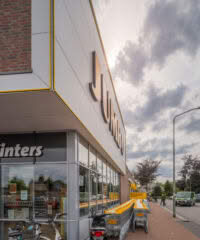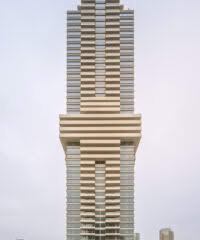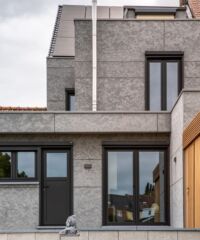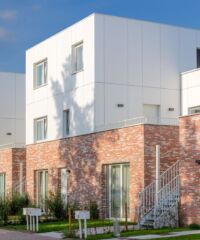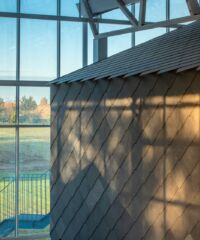SVK as innovative fibre cement manufacturer
SVK has been producing building materials in Sint-Niklaas for more than 115 years. Throughout our history, we have constantly reinvented and adapted. We look back on this past with pride and reap the benefits of the know-how acquired during this journey.
Today, as SVK, we also look back on more than 100 years of experience in the production and sale of fibre cement materials. We are proud of the leading and innovative position we have acquired in this through our years of experience.
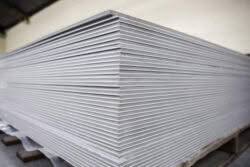
What is fibre cement?
The success story of fibre cement began in 1894 in Vöcklabruck, Austria, where Ludwig Hatschek invented fibre cement according to the Hatschek process. This process still forms the basis of the production process of the fibre cement we know today.
Fibre cement is a strong, stable, fireproof, durable and versatile material, perfect to use as a basis for the production of materials applicable as cladding and/or roofing.
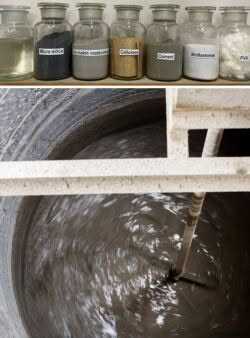
What does fibre cement consist of?
Fibre cement is a composite raw material construction consisting of cement, different types of fibres, aggregates and water.
This strong and versatile material is perfect for use as a base for a façade or roofing.
Fibre cement composition:
- Cement (base)
- PVA fibres (providing the reinforcement & thus the strength of the panel)
- Cellulose fibres (providing the reinforcement & thus the strength of the panel)
- Fillers
- Water
Today, all SVK fibre cement panels are still produced using the traditional Hatschek method. This is a manufacturing method that can create a product with the desired thickness and properties through the construction and pressing of individual layers, resulting in an ultra-stable, extra-strong and durable end result. The resulting strong, versatile and thin material is perfect for applications like cladding or roofing, such as façade panels and slates.
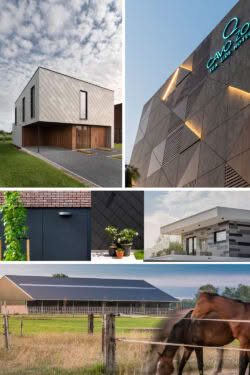
What are the advantages of fibre cement?
The use of fibre cement products in classical residential construction to high-rise and agricultural buildings has been popular for decades. Find out why below.
- Fibre cement is highly fire-resistant
- Strong material
- Long lifespan
- Many uses
- Many finishes
- Can be recycled
- It is very low-maintenance
- Suitable for both new builds and renovations
- Ideal for additional insulation of façade & roof, due to its limited thickness
- Budget-friendly
- Ideal price-to-quality ratio.
Fibre cement facade panels
Fibre cement siding is the ideal façade solution for both new builds and renovation projects. The façade panels have a suspended fastening, eliminating the need for prior earthworks.
The panels are always fastened in a ventilated manner. This is important because such ventilation allows moisture diffusing from the inside into the cavity to drain smoothly and prevents internal condensation. A second advantage of ventilated installation is the only limited heating of the structure under sunlight conditions. In fact, a dark panel can reach more than 60°C in the sun. Ventilation of the cavity avoids exposing the underlying building materials to such high temperatures.
Our assortment consists of Puro Plus, Decoboard Classic, Decoboard Pure, Ornimat, Colormat Classic, Colormat Touch & Colormat Scripto
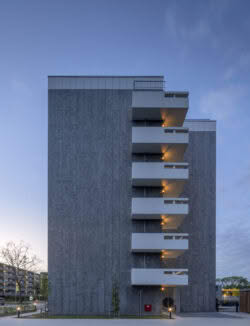
Why fibre cement facade panels?
Fibre cement is a highly durable material. For example, fibre cement façade panels have demonstrated a long service life of at least 50 years. This term may be far longer, however – the material with its current formulation is too new to cite any examples beyond 50 years.
The composition of fibre cement also ensures that the panel will never rot. In addition, the material is resistant to living organisms such as mould, bacteria, insects and pests.
In short, the possibilities are endless. For example, panels can also be perforated for a playful visual effect. But mailboxes can also be made from the same material, or house numbers milled out.
Fibre cement slates
The fibre cement slates for roof & façade from SVK combine the look of natural slates with the top quality of our fibre cement. Our slates are suitable for both roof and façade cladding. There are different types of slates. Our slates are available in various sizes, colours and finishes. For an ultra-modern, or more traditional look, for your project. Our product range includes Ardonit Smooth, Ardonit Textured, Montana Smooth & Montana Textured.
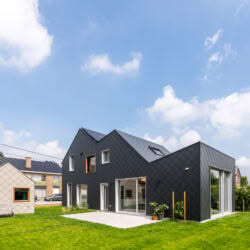
Why fibre cement slates?
Fibre cement slates are extremely light, strong & dimensionally stable. Slates are a much lighter roofing and façade material compared to many other building materials. Despite this, they do not sacrifice strength and durability. There is a reason why our slates also used in regions with extreme weather conditions.
The slates are produced by machine, making them dimensionally stable in length, width and thickness. They do not require any prior sorting for thickness and can be installed straight away. This means huge time and cost savings.
Fibre cement slates, depending on the type of slate, can be covered in different ways, with each mounting method providing a unique look.
Talk to an expert
Do you still have specific questions? You can always contact our technical team without obligation. They will be happy to advise you on the specifications, installation and colour selection of our products.
Realisations — get inspired
